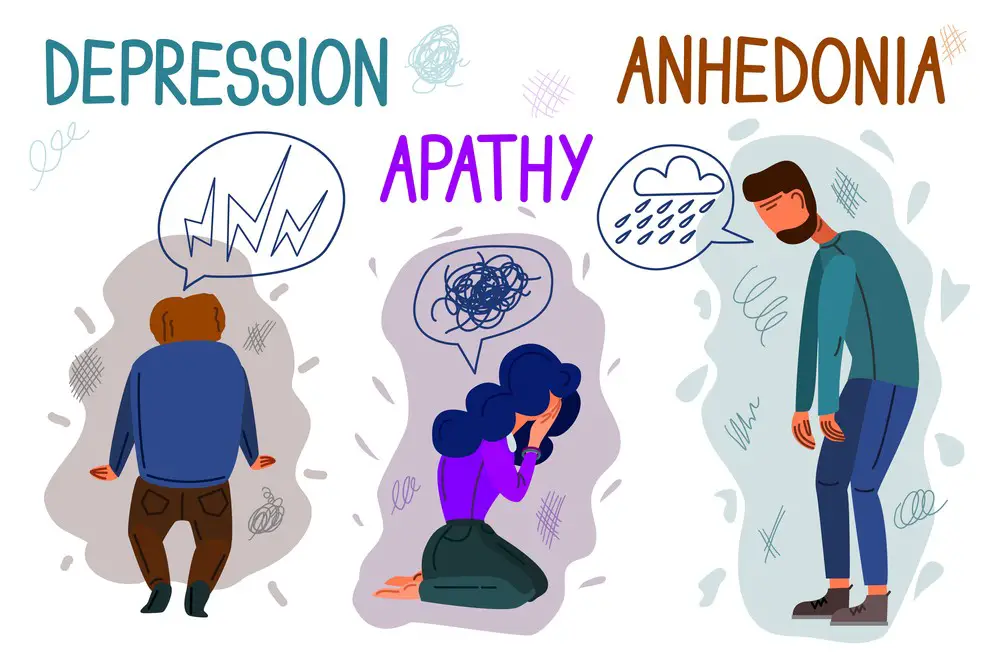As a BetterHelp affiliate, we receive compensation from BetterHelp if you purchase products or services through the links provided
Depression is a common mental health issue that can feel debilitating, especially when it lingers for an extended period. When someone is in a depression slump, they may find it increasingly difficult to participate in their daily activities, focus on their work, and interact with others. Identifying the signs of a depression slump is essential to seeking help and taking steps to overcome this challenging period.
Understanding the nature of depression and the reasons behind a slump is crucial in recovery. Various factors, including life events, pandemic stress, and the role of social media, can contribute to an individual’s mental health state. Implementing lifestyle changes, identifying and managing symptoms, and seeking professional help are essential components in breaking free from a depression slump.
Key Takeaways
- Recognizing the signs of depression slumps allows individuals to seek help more quickly.
- Exploring potential contributing factors can help identify sources and patterns in depressive episodes.
- Utilizing coping strategies and professional support is vital for managing symptoms and progressing toward recovery.

Understanding Depression Slump
A depression slump is a significant decline in an individual’s mental health triggered by negative emotions, thoughts, and experiences. During this stage, a person might experience symptoms of depression like hopelessness, lethargic behavior, irritability, aches, and fatigue.
Depression is a common mental health disorder that affects millions of people worldwide. It’s not just experiencing sadness or feeling down for a short period; individuals with depression often suffer from prolonged despair and dejection. Identifying the symptoms of depression early can be crucial in facilitating the necessary help and support.
Some of the common symptoms of a depression slump include:
- Hopelessness: A continuous sense of despair and pessimism may dominate a person’s thoughts.
- Lethargy: Decreased energy levels often make daily tasks and goals harder to achieve.
- Irritability: An increased sensitivity to frustration and a short temper.
- Aches: Unexplained physical pains like headaches, backaches, and stomach discomfort may arise.
- Fatigue: A constant tiredness and lack of enthusiasm towards once enjoyable activities.
While people may experience these symptoms to varying degrees, it’s essential to acknowledge the situation and seek professional help. Remember, no one is alone in experiencing a depression slump and seeking guidance from a mental health professional could be an essential first step in overcoming these challenging emotions and feelings.
Importance of Acknowledging
Acknowledging one’s emotions, especially during a depression slump, is crucial to regaining control over one’s mental well-being. Instead of ignoring or suppressing feelings of sadness and stress, it’s essential to accept them.
One reason to acknowledge these emotions is that it helps individuals to understand what they are experiencing. People can become more self-aware by recognizing that they are feeling sad or stressed. This heightened self-awareness allows them to identify patterns and triggers which could contribute to their depression slump.
Moreover, acknowledging these emotions enables individuals to process and deal with them effectively. When one accepts their emotional state, they can devise healthy coping strategies to manage their feelings. For example, individuals may engage in healthy habits such as exercise or meditation, which can help alleviate stress and sadness.
Furthermore, acknowledging emotions can be critical in seeking support and treatment. Individuals who acknowledge their emotions may feel more comfortable opening up to friends, family members, or mental health professionals. This openness creates an opportunity for valuable conversations and emotional support, which can aid in overcoming a depression slump.
In short, acknowledging emotions is a vital step in addressing and overcoming a depression slump. By being open to these emotions, individuals can better understand their experiences, develop effective coping strategies, access support networks, and ultimately work towards improved emotional well-being.

Seeking Professional Help
When someone is experiencing a depression slump, seeking professional help is often a crucial step toward recovery. Licensed mental health professionals, such as therapists, psychologists, and psychiatrists, are trained to provide the necessary support and guidance.
One of the most common treatments for depression is therapy. Various types of therapy are available, such as cognitive-behavioral therapy (CBT), psychodynamic therapy, and interpersonal therapy (IPT). A mental health professional will help individuals choose the appropriate therapy type based on their needs. Therapy allows individuals to explore their thoughts and feelings while developing coping strategies and tools to manage their depression.
In some cases, medication may be recommended by a mental health professional to help alleviate symptoms of depression. Antidepressant medications, such as selective serotonin reuptake inhibitors (SSRIs) and serotonin-norepinephrine reuptake inhibitors (SNRIs), can help regulate an individual’s mood and improve overall functioning. Working closely with a healthcare provider to monitor any prescribed medication’s effectiveness and potential side effects is essential.
To seek professional help for depression, one can start by:
- Consulting their primary care physician for a referral to a mental health professional
- Exploring local and online therapy resources
- Contacting their insurance company for a list of covered mental health providers
- Reaching out to friends, family, or support groups for recommendations
Individuals with depression must find a mental health professional they feel comfortable with and trust. Regular therapy sessions and consistent communication with the healthcare provider contribute to a successful treatment plan. By seeking professional help, those struggling with depression can access valuable support and begin their journey toward improving their mental health.

Identifying and Managing Symptoms
Physical Symptoms
Depression can manifest in various physical symptoms, such as aches and fatigue. It is essential to recognize these signs and take steps to address them. To manage physical symptoms, try incorporating regular exercise into your routine, as it can help boost energy levels and improve overall well-being. Additionally, ensure you get adequate sleep and maintain a balanced diet.
Emotional Symptoms
Depression can also bring about emotional symptoms, including sadness and anxiety. When experiencing a depressive episode, it’s essential to understand these feelings and address them appropriately. Implementing healthy coping mechanisms like deep breathing, meditation, and journaling can help alleviate emotional distress. Moreover, speaking with a mental health professional or a support group can guide you during challenging times.
Implementing Lifestyle Changes
Physical Activity
Regular physical activity is a crucial aspect of overcoming a depression slump. Daily exercise at least 30 minutes can significantly positively affect mental health. Aerobic exercises, such as walking, running, or swimming, can help increase serotonin and endorphin levels, which improve mood and overall well-being.
Spending time in nature and enjoying the fresh air can also enhance the benefits of exercise. Research shows that exposure to natural surroundings lowers anxiety and stress levels, contributing to a happier state of mind. Consider outdoor activities like hiking or cycling, effectively combining exercise and nature.
Healthy Eating
Healthy habits, including nutrition, play a significant role in emotional wellness. A balanced diet consisting of whole foods, fruits, vegetables, lean proteins, and healthy fats can provide the nutrients and energy necessary for optimal mental health. Some simple tips to promote healthy eating include:
- Incorporating a variety of colorful fruits and vegetables in every meal
- Consuming lean proteins, such as chicken, fish, or plant-based sources like beans and lentils
- Choosing whole grains over refined ones for fiber and essential nutrients
- Staying hydrated by drinking plenty of water throughout the day
- Limiting processed foods, sweets, and excessive caffeine intake
Incorporating these lifestyle changes that focus on physical activity and healthy eating can greatly contribute to overcoming depression and promoting overall mental health. Make small, manageable adjustments to daily routines; they can significantly improve well-being over time.
Implementing Coping Strategies
Meditation and Mindfulness
Practicing meditation and mindfulness can greatly help in coping with depression. These techniques allow individuals to become more aware of their thoughts and emotions, helping them recognize negative thought patterns and develop greater self-compassion. Through regular meditation, individuals can reduce stress and gradually build resilience to depressive thoughts.
Start by setting aside a few minutes each day to practice mindfulness. This can be as simple as focusing on your breath or engaging in a guided meditation. Incorporate small goals, such as increasing your meditation time or practicing gratitude daily, to help create a consistent habit.
Spending Time with Loved Ones
Connecting with friends and family is vital for emotional well-being. Spending time with loved ones can help individuals feel supported, loved, and understood while coping with depression. Schedule regular meetups, video calls, or activities with friends and family to maintain a strong support system.
Yet, remember to be open and honest with them about your struggles, as they might not be aware of your situation. Having a clear communication channel will allow them to help you in the best way possible.
Self-Care
Self-care is essential for moving forward and coping with depression. Incorporating various self-care activities into your daily routine can help improve your mental and physical health and overall well-being. Here are some self-care practices to consider:
- Exercise: Engage in regular physical activity. Exercising releases endorphins, which can improve your mood and help combat depression.
- Sleep: Prioritize good sleep hygiene. Establish a consistent sleeping schedule and create a relaxing bedtime routine to help improve sleep quality.
- Nutrition: Eat a balanced diet. Fueling your body with the right nutrients not only benefits your physical health but also directly impacts your mood.
- Hobbies: Make time for hobbies and interests that bring you joy. This can be an effective way to cope with depression and relieve stress.
Remember, self-care is a personal journey, and your coping strategies should align with your needs and priorities. By incorporating these techniques into your daily life, you will be better equipped to manage depression and improve overall mental health.
Impact of Pandemic on Depression
The pandemic has significantly affected people’s mental health, particularly in increasing cases of depression. The widespread feelings of anxiety, stress, and uncertainty during these times are contributing factors to this mental health crisis. The disruption of daily routines, loss of jobs, and isolation from friends and family have created challenging situations for many.
As the pandemic continues, the long-term impacts on mental health become more evident. Social isolation has proven to be a key factor in exacerbating feelings of depression. As individuals lose their ability to connect with others, many are experiencing increased feelings of loneliness. The loss of support networks and social interaction has led to a rise in depression rates.
Another aspect of the pandemic’s impact on depression is its immense burden on healthcare workers and frontline personnel. This group has experienced high stress and anxiety, contributing to the mental health crisis. Constant exposure to severely ill patients, isolation from their loved ones, and long working hours have negatively affected their mental well-being.
The severity of the pandemic’s impact on depression rates also varies across different age groups and communities. Young adults and students have been disproportionately impacted due to the abrupt disruption to their education and career prospects. This uncertainty and the pressure to succeed have resulted in higher depression rates among this demographic.
Even as measures to counter the pandemic are implemented, such as vaccination drives and the gradual reopening of communities, the lingering effects of depression remain. Proper mental health support, access to therapy, and social connections are vital for helping individuals cope with their depression and navigate this challenging time. Prioritizing mental health during the pandemic is essential for the overall well-being of individuals and society.
The Role of Social Media
The impact of social media on depression, anxiety, and mental health is a topic that has been discussed widely. While social media platforms allow people to connect with others, share their lives, and stay informed, they can also contribute to mental health issues.
One way that social media can affect mental health is by constantly comparing one’s life to those of others. Many share only their best moments and achievements, leading to a skewed perception of reality. This can cause feelings of inadequacy and increased levels of depression and anxiety.
Addressing social media’s role in mental health can be crucial for individuals trying to overcome a depression slump. Reducing screen time and limiting social media consumption is one strategy to help alleviate negative emotions. Apps and tools are available to track usage and set reminders to take breaks, helping users maintain a healthy balance.
Another aspect to consider is the quality of connections made on these platforms. Engaging in positive interactions and fostering genuine relationships can greatly improve mental well-being. Moreover, following accounts that inspire or motivate can shift the focus from comparison to self-improvement. Users should avoid engaging in negative interactions and arguments that only fuel anxiety.
In summary, social media can significantly affect depression and mental health issues. By understanding its effects, one can make conscious choices to maintain a healthy balance in social media consumption and work towards overcoming a depression slump.
Moving Forward and Recovery
Recovering from a depressive slump can feel daunting, but with the right steps, it’s achievable. Taking action toward improving one’s emotional well-being and embracing motivation is essential.
In the beginning, it’s important to set small, realistic goals. Focusing on these can help those struggling with hopelessness and lacking motivation. Dividing larger aspirations into smaller tasks allows gradual progression without overwhelming the individual.
Physical activity plays a crucial role in moving forward from depression. Regular exercise, even light, can alleviate hopelessness and boost mood. Incorporating enjoyable and maintainable activities, such as walking or yoga, can improve the chances of long-term consistency.
Behavioral activation is an evidence-based therapeutic approach for depression focusing on increasing engagement with positive activities. By planning and participating in satisfying experiences, the individual redirects their focus away from negativity, promoting emotional well-being.
Patience is vital during the recovery process. Progress may be slow at times, and setbacks can occur. Accepting and acknowledging these challenges is essential, continually adapting and adjusting as necessary.
An important aspect of moving forward is being open about the experience of depression. Sharing feelings with friends, family, or a mental health professional can offer valuable support and insight, helping to combat feelings of isolation. Talking about it can provide the strength needed to continue the journey towards recovery.
By combining these strategies, a person can confidently and effectively work towards overcoming their depressive slump. The journey might not be easy, but with determination and persistence, recovery is attainable.
Conclusion
In conclusion, recovering from a depression slump is a process that requires time and effort. It’s essential to acknowledge the presence of a slump to take appropriate actions toward mental health improvement. One can seek professional help or implement self-care strategies targeting depression, hopelessness, and overall mental health improvement.
Making incremental changes in daily habits can significantly impact the recovery journey. Setting realistic expectations is vital, and not making exaggerated claims about the recovery process. Adopting a balanced approach focusing on physical health, emotional well-being, and social interactions is important. Engaging in activities that bring joy, connecting with supportive people, and practicing mindfulness can help alleviate feelings of hopelessness.
In the end, overcoming a depression slump is a journey that demands patience, dedication, and self-compassion. It’s crucial to remain hopeful and determined while working on improving mental health. While the path may be challenging, staying committed to recovery and utilizing available resources can lead to a brighter and healthier future.

Frequently Asked Questions
How can I overcome a mental slump?
To overcome a mental slump, it’s important to identify the triggers and take actionable steps toward alleviating them. This may include seeking professional help, practicing mindfulness, setting achievable goals, connecting with supportive people, and maintaining a healthy lifestyle.
What strategies help in battling depressive episodes?
Effective strategies for battling depressive episodes include cognitive-behavioral therapy (CBT), medication, exercise, maintaining healthy sleep patterns, and building a strong support network. Discussing these options with a mental health professional to find the best solution for each situation is important.
How do I regain motivation when feeling down?
Regaining motivation when feeling down can be challenging, but some methods include setting small, attainable goals; focusing on passions or interests; seeking inspiration from positive sources; and maintaining a regular schedule to create a structure for daily life.
What are effective self-help techniques for managing depression?
Effective self-help techniques for managing depression may involve practicing mindfulness, regular physical activity, prioritizing sleep, connecting with others, journaling, and challenging negative thought patterns. These techniques should always be used with professional help if struggling with depression.
How can I improve my mood and mental well-being?
Improving one’s mood and mental well-being can be achieved through various means, such as regular exercise, engaging in hobbies, fostering connections with loved ones, learning new skills, and focusing on positive aspects of life. Incorporating these practices into daily routines can help create lasting and positive changes.
What lifestyle changes can aid in combating depression?
Lifestyle changes that can aid in combating depression include maintaining a balanced diet, engaging in regular exercise, avoiding the consumption of excessive alcohol and illicit substances, seeking quality sleep, managing stress, and building a supportive network of friendships and connections. These healthy habits contribute to a more balanced mental state and can lessen the impacts of depressive symptoms.
- 7 Ideas to Help You Relax and Unwind on a Family Vacation - April 27, 2025
- How Having Cybersecurity Protection Helps You Relax - April 25, 2025
- 8 Reasons Why Spending Time Outside Calms You Down - April 25, 2025
This site contains affiliate links to products. We will receive a commission for purchases made through these links.



